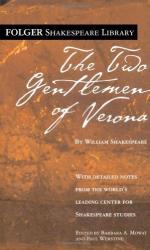|
This section contains 4,127 words (approx. 14 pages at 300 words per page) |

|
SOURCE: “The Two Gentlemen of Verona as Burlesque,” in English Literary Renaissance, Vol. 12, No. 2, Spring 1982, pp. 210-19.
In the following essay Rossky maintains that The Two Gentlemen of Verona, particularly the play's ending, is intended as a burlesque, rather than as a serious but ultimately failed attempt to portray the conventions of Renaissance thinking on ethics.
Among the variety of critical approaches which attempt to explain why The Two Gentlemen of Verona is, or seems to our time to be, a Shakespearean failure, the most prevalent is the rationalization that the play is a serious dramatization of conventional Renaissance ethical thought, especially on the supremacy of friendship over love—ideas quite different from our own, meaningful to Elizabethans though hardly to us.1 A few critics, however, have of late tentatively or fleetingly suggested that the play is essentially a burlesque.2 The position of this essay is that the...
|
This section contains 4,127 words (approx. 14 pages at 300 words per page) |

|


